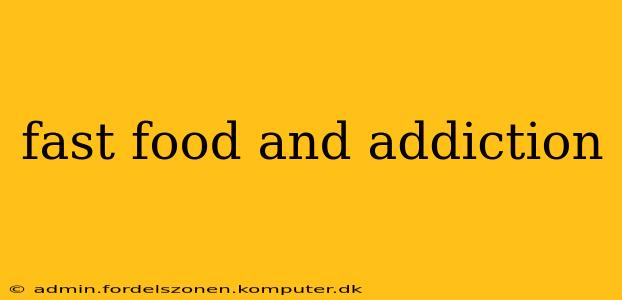The alluring aroma of sizzling burgers, the satisfying crunch of fries, the sugary sweetness of soda – fast food is undeniably tempting. But beyond its immediate gratification lies a growing concern: is fast food addictive? While not classified as a substance addiction like nicotine or heroin, the compelling evidence suggests a strong link between habitual fast food consumption and addictive-like behaviors. This article delves into the science behind this connection, exploring the role of food processing, marketing tactics, and individual vulnerabilities in driving this potentially harmful pattern.
What Makes Fast Food So Appealing?
The addictive potential of fast food isn't solely about taste. Highly processed ingredients are engineered to maximize palatability, triggering reward pathways in the brain. These foods are often high in fat, sugar, and salt – a potent combination that stimulates the release of dopamine, a neurotransmitter associated with pleasure and reward. This creates a powerful feedback loop: consuming fast food leads to a dopamine rush, reinforcing the behavior and making it harder to resist in the future.
Is Fast Food Addictive in the Same Way as Drugs?
While the mechanisms differ from substance addiction, the behavioral patterns can be remarkably similar. Fast food can lead to cravings, withdrawal symptoms (like irritability and fatigue when abstaining), and compulsive consumption, despite negative consequences for health and well-being. Research indicates that certain individuals may be more susceptible to these addictive-like behaviors, potentially due to genetic predispositions or underlying mental health conditions.
What are the symptoms of fast food addiction?
Symptoms can range from mild to severe, and they may vary depending on the individual. Common signs include:
- Intense cravings: An overwhelming urge to consume fast food, despite negative consequences.
- Loss of control: Difficulty limiting consumption, even when intending to eat less.
- Withdrawal symptoms: Experiencing negative physical or emotional effects when avoiding fast food, such as headaches, fatigue, irritability, or anxiety.
- Continued use despite negative consequences: Continuing to eat fast food despite awareness of its detrimental effects on health, finances, or relationships.
- Neglecting other aspects of life: Prioritizing fast food consumption over other activities or responsibilities.
It's crucial to remember that experiencing some of these symptoms doesn't automatically equate to addiction. However, a pattern of multiple symptoms indicates a potential problem requiring professional evaluation.
How does fast food marketing contribute to addiction?
The aggressive marketing strategies employed by fast food companies play a significant role. Targeted advertising, often featuring visually appealing imagery and celebrity endorsements, creates an association between fast food and happiness, success, or social belonging. Clever pricing strategies, such as value meals and combo offers, further encourage overconsumption. These tactics exploit psychological vulnerabilities and contribute to the normalization of frequent fast food consumption.
What are the health risks associated with fast food consumption?
Excessive fast food consumption is strongly linked to various health problems, including:
- Obesity: High caloric density and low nutritional value contribute to weight gain and obesity.
- Type 2 diabetes: High sugar and refined carbohydrate content increase the risk of developing insulin resistance and type 2 diabetes.
- Heart disease: High levels of saturated and trans fats elevate cholesterol levels, increasing the risk of heart disease.
- Certain cancers: Processed meats and high levels of saturated fat are linked to an increased risk of certain cancers.
- Mental health issues: Studies suggest a correlation between fast food consumption and depression and anxiety.
Overcoming Fast Food Consumption Habits
Breaking free from habitual fast food consumption can be challenging, but it's achievable. Strategies include:
- Gradual reduction: Slowly decrease fast food intake over time, replacing it with healthier alternatives.
- Mindful eating: Pay attention to hunger cues and avoid emotional eating.
- Meal planning: Prepare healthy meals and snacks in advance to avoid impulsive fast food choices.
- Seeking support: Consider seeking support from a registered dietitian, therapist, or support group.
Understanding the potential addictive nature of fast food is a crucial first step in developing healthier eating habits. It's vital to recognize the environmental factors and personal vulnerabilities that contribute to this pattern and to take proactive steps towards a more balanced and nutritious diet. Remember, seeking professional help is always an option, and it's a sign of strength, not weakness.
